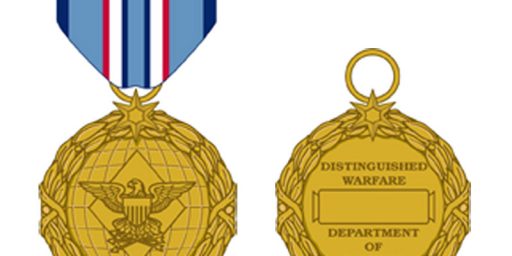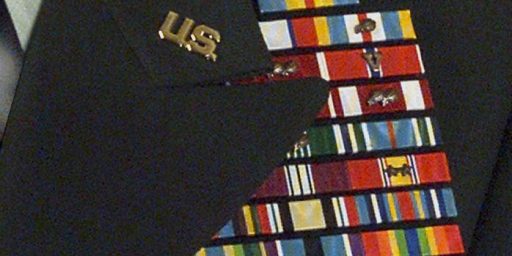Accidental War Deaths Medal
Some families of service members who died while deployed in combat zones but not from enemy fire are petitioning for the creation of a medal for accidental war deaths.
Richard Perez made just one request when he said goodbye to his son on a tarmac at March Air Reserve Base just east of [Los Angeles]. “Get back here no matter what,” Perez told Rich Jr. Six months later, and one week shy of his return from Iraq, the 19-year-old Marine was killed when a truck accidentally crushed him.
At the funeral, Perez asked a military officer about his son’s Purple Heart — and was told the military issues the honor only to those killed or wounded in combat. There would be no special medal for Richard Perez Jr. “These are honors, the highest things that can be bestowed on these guys,” Perez Sr. said recently. “That’s all you’re really left with.”
Following his son’s death in February 2005, Perez joined a small but growing group of families who are petitioning Congress to create an alternative medal honoring those killed in a war zone but away from combat. In Iraq and Afghanistan, that amounts to more than 600 men and women — more than 20 percent of the deaths so far.
Leading the effort is Eleanor Dachtler, who lost her 19-year-old son during an insurgent attack in Iraq and received her son’s Purple Heart posthumously. Currently, the families of those who die non-combat deaths say they receive medals honoring their loved one’s service, but nothing recognizing their death. “Anybody who goes over there and gives their life for their country deserves to be recognized,” said Dachtler, whose son, Lance Cpl. Nicholas Anderson of Las Vegas, was killed in November 2004. “How can you sit there and say one person’s life is less valuable than another person’s life?”
[…]
The families of those killed in non-combat incidents have said they do not want to change the criteria of the Purple Heart. What they do want is a medal to honor their loved one’s sacrifice. “He died in honor, serving his country,” said Frank Guastaferro, a Vietnam veteran whose 27-year-old son Daniel died in January 2005 when his Humvee plunged into a canal in Iraq. “I am very proud of him for what he accomplished.”
As tragic as the loss of life is to family members, it’s unclear to me why getting killed in a car crash in Iraq is different from doing so while on maneuvers at the National Training Center. The Purple Heart is different because it involves actual combat with the enemy, the thing that makes war war.
The more awards created for things other than valor or genuine achievement, the less meaningful they all are. Soldiers deployed to war zones already get multiple awards: An expeditionary or campaign medal, the National Defense Service Medal (awarded to anyone in the military during the conflict), a tour award, and sometimes awards issued by foreign governments as well. That’s in addition to any awards for actual heroism. Enough already.






I can easily understand the feelings of these parents. I agree that there are many “trite” awards as you have suggested in the last paragraph. Heck, almost every week on TV there seems to be some awards show to honor the mediocrity of our culture. But I think death in a supporting role in war is worth some recognition. It would be OK in my book to figure out some dignified way of honoring these individuals without diminishing the importance/distinction of injury or death in the direct combat situation.
It might be OK if DoD wanted to create a “hazards of military service” award that was given to surviving family members whenever a soldier died while in military service.
It should have nothing to do with whether or not their service was in a combat zone. There are already campaign ribbons, etc for that.
If my kid is deployed to a war zone and is killed while in that war zone, it wouldn’t matter to me whether he/she was killed by an enemy bullet (or bomb) or run over by a truck. The kid is still dead and still died while in the service of his/her country.
I’ll have to side with those who believe that anybody who dies while in the service of their country should be honored. I’m kind of surprised that you would feel differently, James.
Len,
The kid gets a military funeral and several awards for being in the country.
Again, why is a truck accident in Iraq different from one at Fort Benning? You don’t get a medal for either right now.
It just is. Kind of like the difference between going to Vietnam and serving stateside in the Texas Air National Guard, I guess.
(Whoa… I’m gonna get burned for that one!)
Anyway… I’m going to hold to my belief that any person who enlists in the military, is sent to a war zone, and dies while serving in that war zone is due honor, regardless of how the death occurred.
I think one of the differences is the anxiety of the parents. A parent rightly worries when their child joins the military as there is a greater danger than being a barrista at Starbucks (I just know someone will link to an OSHA report showing more injuries due to coffee than service in Iraq). And when a child or spouse is sent to a combat zone, the ones left at home would justifiably worry even more, even if they soldiers job was as a cook.
While “I didn’t catch the clap” medals are rightly looked at askance, this sort of medal is not meant to fill out a dress uniform, but rather to help comfort the dead. So I wouldn’t have any problem with an “ultimate sacrifice” medal that was for those who died while in service (whether is falling down the stairs in Ft Dix or getting killed by an IED on Iraq).
Personally I would make it for anyone who dies in service, but I could see a special designation for those who died in a combat zone (and maybe another designation those who died in combat). But to say that this shouldn’t be done because it is a “less meaningful” award doesn’t make sense to me.
I am sorry if, as someone who served in uniform for 14 years, I fail to understand why someone who died in an accident in a combat zone “deserves” a medal. Everyone who serves gets a variety of awards for being in various places at the right time. A very few people earn awards for personal achievement. Very very few receive special recognition for great bravery or courage or sacrifice. Dying in an accident, while tragic, does not, generally, involve great bravery, courage or sacrifice — it involves, mostly, bad luck. Since when does or should bad luck merit a medal? Some years ago, I interviewed a veteran who served in Vietnam and was injured in a freak shipboard accident that blinded him in one eye. He received no honors or awards — and he didn’t expect any. I note that it is families clamoring for these awards. I don’t hear service members demanding such awards. Maybe funerals with military honors, theater awards, and the death benefit are not enough any more. We need some medal that, in the end, demeans those medals earned for bravery, courage and sacrifice by creating an award for misfortune.
Sorry to have to disagree. I still believe that serving in the military in a combat zone during a time of war involves great bravery, courage and sacrifice and anybody who dies while in that service is deserving of honor.
You speak of bad luck. Basically, anybody who dies in the service does so as the result of bad luck. You could hardly consider driving over a road-side bomb or getting in the way of an enemy bullet to be good luck, could you?
I tend to agree that people who die in legitimate incidents should get awards. Such as the man from my husband’s battalion who died when a vehicle rolled on him.
At the same time, I can’t help but think about the two others from the same battalion who died because they were playing catch with a grenade, which went off. Is that really deserving of an award?
All three of the above men were posthumously awarded bronze stars, which very few men in that battalion received.
I also wonder about the first man killed in the battalion in Iraq, who was given a package by a young child and died when the package exploded. Is that considered combat? Did he receive an award? I mean, he was killed by an enemy. But I don’t recall hearing what happened in that case.
I believe the Purple Heart requires that the injuries be as a result of enemy action. That is a good standard. Soldiers who die of non-hostile action get awards and medals and honor and recognition. The Purple Heart is a unique award that signifies some form of combat participation. It should stay that way.
So are we talking about a medal for any one who dies in the military, while on duty? i.e. A soldier gettting run over by a tank at NTC would qualitfy?
If not, how do you distinguish awards in areas where Hazardous Fire and Hazardous Duty pays are authorized, but that are not considered ‘war zones’ by the general public? What about accidents in other Gulf States, resulting from support of the war effort?
“Either everybody gets a medal, or nobody does! We can’t be exclusionist!”
[/latter-day Little League parent]